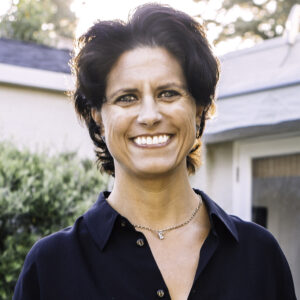The PCC EWD 2024 Future Of Work Conference – Part 2: Keynote Speakers
Every conference highlights the notable accomplishments of its Keynote speakers, who are invited to participate based on their exceptional contributions to their industry. The two keynote speakers at the 6th Annual Future of Work Conference hosted by the Economic and Workforce Development division of Pasadena City College are no exceptions to this practice. In fact, the perspectives of both Julie Urhman, President and Co-Founder of the Angel City Football Club (ACFC), and Jasmine Star, a highly regarded business strategist, melded nicely with the conference topic: “Championing a Transformative Future.” Each shared her personal and professional story and how those led her to her current role. Both overcame significant hurdles to attain the high levels of success they’ve achieved. Together, they epitomize the meaning of ‘transformation.’

Julie Urhman – Angel City Football Club
If you thought the co-founder of a professional sports team began as a player of that sport, you’d be wrong if you’re talking about Entrepreneur Julie Urhman. She came to the ACFC through her work as a PR leader. She joined her friend and fellow founder, actor Natalie Portman (along with venture capitalist Kara Nortman), to build a female-focused sports franchise around the mission of ‘improving equity through sports.’ None of the three women were affiliated with any kind of sport before the ACFC came into being. They were all focused on their ‘real’ jobs in public relations, media, and venture capitalism.
However, the three came together around the drive to ‘change the business of women’s sports‘ by developing a professional women’s soccer team that would rival the popularity and success of a men’s team.
By all accounts, they are achieving that goal within their first two years in business as the ACFC. Urhman credits several influences that have bolstered the team’s upward trajectory:
- Social Media – Today’s sports fans connect not just with their team but also with their favorite players, and social media channels offer that direct interaction. The player’s opportunity to commune with and support their fans where the fans are is unmatched, and the ACFC uses carefully curated data and AI resources to ensure their messaging responds directly to their fans’ preferences.
- Advancing Equity Initiatives – The past few years have revealed the deep and wide economic rifts between men’s and women’s sports, and the ACFC intends to reduce that gap. That effort began with the original pitch to potential club sponsors, who, according to Urhman, “are not transactional entities.” Rather than simply placing a logo on a cup, the ACFC strategy embraces investors who already share their equitable outlook. Further, because of the nature of the team leadership triad, international sponsorship was available. Because soccer is a global sport, the PR outreach effort to establish and popularize the ‘ACFC brand’ predated the launch of the actual team. Consequently, investors and fans were ready, willing, and waiting for games to start as the ACFC took to the field for its first game.
- Knowing Who to Approach – An early lesson came from attending meetings with funding entities that weren’t interested in sports, soccer, or women’s athletics. ‘Traditional’ investors asked traditional questions, many of which weren’t relevant to ACFC’s quest. Instead, the trio turned their attention to investors who were already open to new ideas. Some came on board because of the entrepreneurial aspect of the club; others were simply great soccer fans, and fans of women’s soccer.
The team’s insights have paid off well. Urhman notes that today’s ‘fandom’ spreads far beyond the bleachers; while 1% attend games, 99% access ACFC assets from a distance. Despite its LA base, the club now sells its merchandise in all 50 states and 50 different countries.
Looking forward, Urhman and the ACFC leadership team have several initiatives in action or in mind to better serve the community:
- They’ve already allocated 10% of all sponsorship dollars for community use.
- Their Player 22 Program connects current and past players with financial and entrepreneurial resources so they can pursue a future in sports once their game days are over.
- The college student demographic is one of their primary target markets and an excellent resource for fans, employees, and future investors. And their investment in college women is especially welcome: apparently, the lack of a sports bra is the single biggest reason why more girls and women don’t play sports. The Angel City Football Club is working to address that concern, too.
Urhman’s commentary was informative and inspiring, and so also completely worth watching again. Click here to watch a replay of the event and hear Julie Urhman’s invaluable contribution.

Jasmine Star – Inspired Corporate Strategist
The closing Keynote Speaker’s job is to send attendees off, inspired to do more in their sector with the information gleaned from the conference. Jasmine Star, the closing speaker at the FOW conference, did precisely that by sharing her back story and the methods and mindsets she used to build her multimillion-dollar brand.
A first-generation college student herself, Star recognizes the struggles many people endure as they strive to attain their early goals. Home-schooled by enlightened and engaged parents, she vigorously pursued her passions, even when she couldn’t adequately articulate them. She focused on education enough to earn a bachelor’s degree from Whittier College and entry into UCLA’s Law School. She was self-aware enough to know that law wasn’t her future. Instead, she withdrew from that school, purchased her first camera, and became a noted and highly skilled photographer.
That educational evolution illuminated for her her foundational mantra: “Possibility is Impossibility in Disguise.” The message helped her see that the barriers she perceived often suggested their own solutions if one is willing to look for them. She embraced that notion and set aside her hesitation in favor of her confidence that she could achieve anything she prioritized.
The consequence of her mindset turnaround? In addition to her internationally acclaimed photography business, she added titles to her resume:
- ‘Business Strategist’ by helping hundreds of companies and corporate leaders overcome industry and personal challenges to achieve greater success;
- ‘Tech Company Founder’ by launching Social Curator, a software program that customizes online content for customers and
- ‘Podcaster and Motivational Speaker’ by sharing her story, her unique and varied paths to success, and her uninhibited enthusiasm for growth and development.
As a leader, she also developed mindset strategies to help companies of all sizes excel:
- ‘Candor’ is more productive than ‘critique.’ Employees do better when their effort is appreciated, even if it isn’t optimal for the project.
- Stay humble. Leaders work FOR their team, not the other way around.
- Be empathetic. Acknowledging that people are doing their best alleviates their stress.
Star closed with her ‘Three P’s’:
Perseverance – stick to your strategy through till its end.
Patience – things rarely go as planned – be ready for that.
Promise – not to quit on yourself.
Following these concepts allows leaders to ‘live in the gain, not in the gap,’ and Jasmine Star is certainly a role model for that business leader mindset.


